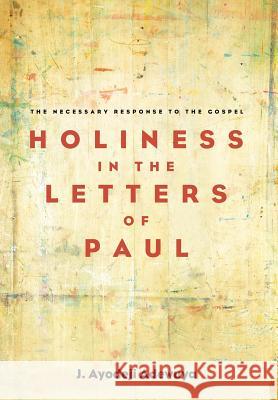Holiness in the Letters of Paul » książka
Holiness in the Letters of Paul
ISBN-13: 9781498294560 / Angielski / Twarda / 2016 / 206 str.
Holiness in the Letters of Paul
ISBN-13: 9781498294560 / Angielski / Twarda / 2016 / 206 str.
(netto: 168,73 VAT: 5%)
Najniższa cena z 30 dni: 176,18
ok. 16-18 dni roboczych.
Darmowa dostawa!
Paul's understanding of holiness stems from the holiness of God as revealed in the Old Testament. Using varied terminology, Paul describes the holiness that should characterize the believers as the people of God. God expects moral integrity of his people, because he has provided believers with his Holy Spirit to enable them to live exemplary, Christlike lives in this present world, though polluted, as they prepare for the world to come. Believers, who, like Paul, anticipate the Parousia, must not only desire but also pray that holiness becomes a reality in their lives, cognizant of the fact that holiness is a matter of practice, not merely a status that one attains upon justification. Thus, holiness is an imperative for the people of God. ""In Holiness in the Letters of Paul, Adewuya underscores how important it was for Paul that trusting Jesus should lead to a transformed life. God's purposes for the world in the death of Christ and the release of the Spirit do not culminate in the awakening of mere belief, but in the realization of the 'new creation' first and foremost through people who no longer live for themselves, but rather live for the Christ who died and was raised on their behalf--through people, that is, through whom Christ lives. Working through each of the letters attributed to Paul, Adewuya makes a strong contribution that restores 'holiness' to a central place in the discussion of Paul's gospel and in the lives of those who would receive the good news."" --David A. deSilva, Ashland Theological Seminary ""In this helpful work, Adewuya attentively explores the often-neglected theme of holiness and related concepts in Paul's letters, offering an important new contribution to Pauline theology. Others who examine this subject have praised Adewuya's previous seminal work on the subject, and will find here perhaps the most thorough treatment of the topic to date."" --Craig S. Keener, F. M. and Ada Thompson Professor of Biblical Studies, Asbury Theological Seminary ""Ayo Adewuya has put us all in his debt by offering the first substantive, comprehensive treatment of holiness in the writings of Paul. Demonstrating the essential role the multifaceted issue of holiness plays in Pauline thought, Adewuya's work necessitates a revising of previous work on the Pauline literature to fill the lacuna created by the absence of sustained attention to this vital aspect. His work is to be heartily commended and welcomed by all those working on the Pauline literature, as well as those interested in a biblical understanding of this often misunderstood subject."" --John Christopher Thomas, Clarence J. Abbott Professor of Biblical Studies, Pentecostal Theological Seminary, Cleveland, TN; Director, the Centre for Pentecostal and Charismatic Studies, Bangor University, Bangor, UK ""Holiness in the Letters of Paul provides a helpful treatment of a neglected topic. He shows clearly the importance of holiness in Paul's theology and ethics. Adewuya demonstrates how pervasive talk of holiness is within the Pauline corpus, even as he argues that the contemporary church needs to give more and better attention to it. This book's construction of holiness in Paul should stimulate further work on this important topic."" --Jerry L. Sumney, Professor of Biblical Studies, Lexington Theological Seminary ""All too often scholars neglect the topic of holiness in the study of Paul, and yet it is clearly a fixture in his thought and vocabulary. Adewuya fills an important gap in scholarship by carefully examining Paul's holiness language in the context of each of his letters. Both Adewuya's exegetical and synthetic work offer clarity and fresh insight.Given his career-long dedication to this topic, Adewuya serves as the perfect guide."" -- Nijay K. Gupta, George Fox Evangelical Seminary J. Ayodeji Adewuya is Professor of Greek and New Testament at the Pentecostal Theological Seminary, Cleveland, Tennessee. He is the author of Holiness and Community"











